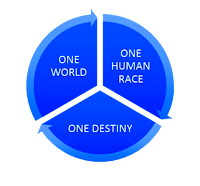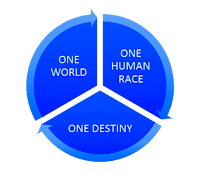Theistic Religons and God: Should Believers Question the Messengers More? Part2
Today,
millions of Christians all over the world will be going to their churches to
pray and celebrate their belief that Jesus Christ rose from the dead and
ascended up to Heaven. Many might not even take this as an opportunity to
question whether it really is possible for anybody to rise from the dead,
unless he/she was not really dead, or give a thought to the billions of people
who have already died and failed to rise from the dead.
Of course, this is also a question which some of the authors and inspirators of the Christian religion have pre-empted, and provided a convenient answer, namely that that everybody else would have to wait until Judgement Day, as Jesus is only demonstrating the process by which this feat of being resurrected can be achieved.
Of course, this is also a question which some of the authors and inspirators of the Christian religion have pre-empted, and provided a convenient answer, namely that that everybody else would have to wait until Judgement Day, as Jesus is only demonstrating the process by which this feat of being resurrected can be achieved.
At
the end of my blog post, entitled, Theistic religions and God: should believers
question the messengers more?, which I posted on 20/03/2016, I posed the
following:
So, would
there be no place for churches in our lives, if god does not exist and people
did not have to worship him/it/her, in order to try to 'get saved' and go to
'heaven'?
Now,
it might well be the case that those of you who have read that previous blog
might have concluded that I do not believe in a sentient god per se. Be that as
it may, it would take a massive leap of incredulity for me to deny the
important and crucial role which churches of all denominations and faiths are playing
in the lives of not only their members, but the lives of other people; both
believers and non-believers.
Churches
and the religions they bear testimony to have clearly played a significant role
in the development of contemporary societies. Like many other ideas and
theories, e.g., such as communism, socialism, and liberalism, theistic
religions such as Christianity and Islam, e.g., in their evolution and history,
will have given rise to unspeakable evil, as well as good works. We have seen the depiction of such evil in
writings and pictures of what one could categorize as the age of religious
brutality, with notable examples being the Borgias, the Spanish Conquistadores
in the Americas, the Crusades, etc.
At the same time, if allowed to evolve, religions can and have also been a force for good. Christians and others who read their Bible, will notice the marked difference between The Old Testament Books of the Bible, with their emphasis on the basest ‘god-inspired’ human motives, such as an eye for an eye, revenge, and dealing in death and destruction; the age of brutality.
At the same time, if allowed to evolve, religions can and have also been a force for good. Christians and others who read their Bible, will notice the marked difference between The Old Testament Books of the Bible, with their emphasis on the basest ‘god-inspired’ human motives, such as an eye for an eye, revenge, and dealing in death and destruction; the age of brutality.
This compares with the more genteel and
balanced perspective of the New Testament, which could be characterised as
falling into the remit of the age of enlightenment; spiritually at first,
before it became reflected in the lives of people and society.
Historically,
the church and various religious orders have made significant contributions in
the fields of politics, medicine, the fight against oppression, learning and education,
etc. Many still continue to perform valuable roles in these and other fields.
In the Americas, there has been such a thing as ‘liberation theology’, which
has attempted to oppose the more oppressive doctrine of the Catholic Church
establishment, which, like other faiths, seems more interested in making a
virtue of the people’s suffering and oppression, thereby enabling the rule of
the ruling elites.
In
my view, theistic religions can not only exist and continue to make substantial
contributions towards people’s lives, but they probably could make a much
bigger contribution by removing the notion of god from their doctrines. With
each religious faith tending to portray ‘their god’ as being in their own
image, this has tended to source conflict, especially where there are other
differences, such as ethnicity, culture and language, between them.
What is more, the fact that the adherents of each religion has tended to give ‘their god the final say’, has, probably to differing degrees, closed the door on human reasoning. Yes, some will say relying on ‘human reasoning’ is not sufficient, and that it is better to rely on ‘this or that scripture’ or ‘the word of god.’ However, the fact still remains that no man or woman can reasonably ‘prove what is the word of god’, unless that god is an entity which has been created by man and given his voice, or, rather, voices, as different ‘prophets’ profess to speak for their god/s.
What is more, the fact that the adherents of each religion has tended to give ‘their god the final say’, has, probably to differing degrees, closed the door on human reasoning. Yes, some will say relying on ‘human reasoning’ is not sufficient, and that it is better to rely on ‘this or that scripture’ or ‘the word of god.’ However, the fact still remains that no man or woman can reasonably ‘prove what is the word of god’, unless that god is an entity which has been created by man and given his voice, or, rather, voices, as different ‘prophets’ profess to speak for their god/s.
To be continued






Comments